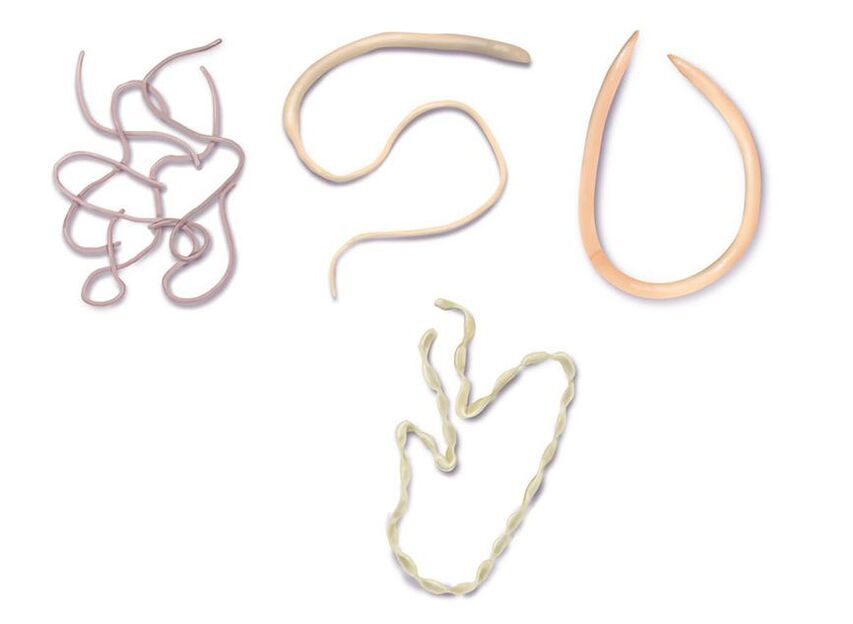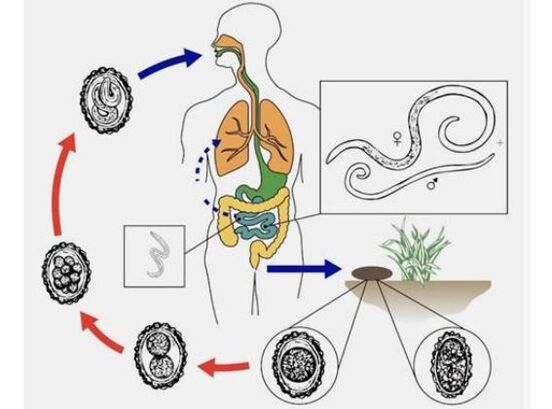Parasitesis a very common phenomenon that can be easily recognized in most people during a routine medical examination.
Experts have many methods and techniques to identify and diagnose worms in the bodies of children and adults. At the current stage of medical development, this is not at all complicated. In addition, many types of helminths can be detected independently, leaving the body and entering the external environment. This process usually occurs when females reproduce and lay eggs.
Further determination of the type, quantity and life cycle duration of human worms must be carried out in special clinics during a comprehensive examination.
Types of worms in humans

Representatives of helminths are determined based on general characteristics and lifestyle, life cycle and developmental characteristics. It also takes into account how worms manifest themselves in humans, how long they live in the body and what diseases they cause.
Doctors can detect the presence of the following types of worms in the body:
- nematodes, roundworms.Life cycle not exceeding 40 years; they are parasitic in the intestines. May affect the respiratory system and stomach. Representatives: pinworms, roundworms, whipworms;
- Ice parasites.They can live in the intestines and move throughout the body for about 20 years. Large sizes reach 8-10 meters. Individual tapeworms of beef, pigs, and tapeworms;
- flukes, flukes.They appear in internal organs and subcutaneous tissue. It moves throughout the organs and can be life-threatening.
Each of the above groups has its most common representatives in humans.
And each of them poses a serious danger to health and the normal functioning of the body:
- roundwormsMay cause: appendicitis, jaundice, bile duct inflammation;
- pinworm.Leads to complications: gastritis, allergies, neurological disorders;
- whipwormCan cause dysentery and rectal prolapse;
- Toxocara.Manifests in vision loss, bronchitis, necrosis of the pancreas, liver, kidneys, and brain dysfunction;
- Echinococcus.It causes danger in the form of anaphylactic shock, hives, hepatomegaly, cyst formation and death;
- Trichinella.May cause infiltrates and damage to the heart and brain;
- Giardia.Consequences: anemia, gastritis, Quincke's edema, pancreatitis;
- hookworms.May cause intestinal dysfunction;
- broadband.Promotes the development of anemia, vitamin deficiency, intestinal tissue necrosis, spinal cord damage;
- threadworm.Can cause diseases: conjunctivitis, lymphadenitis, asthma, abscess; lung flukes. They cause enteritis, bronchitis, fever, meningitis, and tachycardia.
These are just some of the parasites that are mentioned quite often. There are worms that are less dangerous but still harmful. Therefore, it is important to study them in laboratory conditions.
Worm infection

It is not difficult for parasites to enter the human body. They cannot be detected or identified in the environment because they are usually in the tiny larval or microscopic egg stage.
There are certain methods and routes of infection:
- water sourceIn most parasitic species, larvae spend the intermediate stages of their life cycle in both fresh and salt water. They are sometimes found in intermediate hosts such as fish and shellfish;
- wet sand or soil. Together with the feces, mainly eggs, are excreted for further development or in search of temporary carriers of pathogens;
- Dirty unprocessed vegetables, fruits, herbs. From the soil, future parasites penetrate the surface of the product;
- animals: homeless and domestic. Temporary media.
Even an ordinary walk with a child or a trip to the store, calling the elevator or dirty handrails can cause parasites to appear. To prevent this, it is necessary to adhere to simple personal hygiene rules, regularly carry out wet cleaning of the house and ventilate the room where the workplace is located.
Worms in adults, their signs and symptoms

Characteristics alone cannot clearly determine whether a person is infected with helminths.
How can you check if you actually have worms?
To do this, there are general characteristic signs of the presence of worms in humans and methods for their identification:
- changes in appetite, including its increase and decrease;
- nervous, scared, excited. Fatigue and weakness may also occur;
- snoring, difficulty breathing while sleeping;
- intestinal problems, including diarrhea and constipation;
- bloating;
- headache, dizziness;
- swelling of limbs;
- itching in the anus;
- increased body temperature;
- blood pressure fluctuations;
- skin rash, redness;
- nausea and vomiting;
- stomach-ache;
- fragility of hair and nails.
These are just a few signs that may indicate the presence of worms in adults. However, these symptoms can also be characteristic of other diseases. Therefore, only a proper examination will allow you to get accurate results.
Signs of worms in children
Still lacking sufficient immunity and protective protein cells, children are often susceptible to more serious consequences when parasites are present in the body:
- intestinal dysfunction, dysbiosis;
- bloating, flatulence;
- dermatitis, hives;
- involuntary urination or urinary incontinence;
- respiratory diseases. Bronchitis, pneumonia, asthma;
- In girls, genital inflammation may occur;
- vomiting, nausea;
- itching and burning in the anus;
- severe stomach pain and abdominal pain;
- sleep disorders;
- worry,
- Newborns may have serious complications or developmental delays.
Identifying worms yourself is quite difficult, and many parents do not think about their presence. By trying to treat their child without the help of a specialist, they can worsen the spread of parasites in the child's body. The consequences in such cases are unpredictable.
Check for different types of worms

How to understand that a person is developing helminthiasis?
Accurate determination of the presence of worms in adults and children is possible only with the help of specially developed research methods.
The doctor prescribes appropriate research methods depending on the symptoms and signs of parasites:
- shaveThis is a traditional and simple method, including taking a sample from the anus to determine the presence of worm eggs;
- stool analysis.This method has been tested but is not always effective because not all helminths are found in the waste;
- General blood chemistry test.It allows you to determine the inflammatory process only by indicators of low hemoglobin concentration and also takes into account leukocytes;
- Diagnosis of CPR.This method involves studying parasite DNA material found in the blood compared to available samples. It provides accurate identification of helminth classes and their numbers;
- Linked immunosorbent assay.This method is also based on the analysis of the patient's blood. The detected IgM and IgG antibody patterns indicate a protective response of the immune system to the worms.
In addition, ultrasound, X-ray and CT scans may be indicated. The need for them is associated with the movement of parasites throughout the organs and their frequent change of location. A biopsy or probe is also used to obtain material from the affected organs. The choice of diagnostic method depends on the type of helminth and the impact on the organs.
Worms: treatment for adults and children
It is important to realize that in most cases the treatment of diseases caused by helminth infections is very complicated. It is not always possible to completely eliminate larvae and eggs of all parasites in one course of treatment. Patients usually need to be under constant medical supervision and undergo regular tests.
What to do in this case?
It is important to follow your doctor's advice and recommendations.
Usually, drugs with a broad spectrum of action are prescribed.
Be especially careful when giving medication to young children and infants. Powerful components of anthelmintics are not always suitable for bodies with low immunity.
Only an experienced doctor can prescribe medication appropriate to the patient's age and the severity of the disease's complications.
Frequently asked questions
What symptoms can indicate the presence of worms in a person?
Symptoms of worms can include constant fatigue, weight loss, insomnia, itching in the anus, worms in the stool, and abdominal pain.
What diagnostic methods are used to determine the presence of worms in humans?
To diagnose worms, stool tests for worm eggs, blood tests for anti-worm antibodies, as well as diagnostic methods such as ultrasound and X-rays can be used.
Helpful advice
Tip #1
Pay attention to symptoms that may indicate the presence of worms, such as constant fatigue, loss of appetite, upset stomach, sleep disturbances, and allergic reactions.
Tip number 2
Contact your doctor for a special stool or blood test to check for worm eggs or antibodies against them.






























